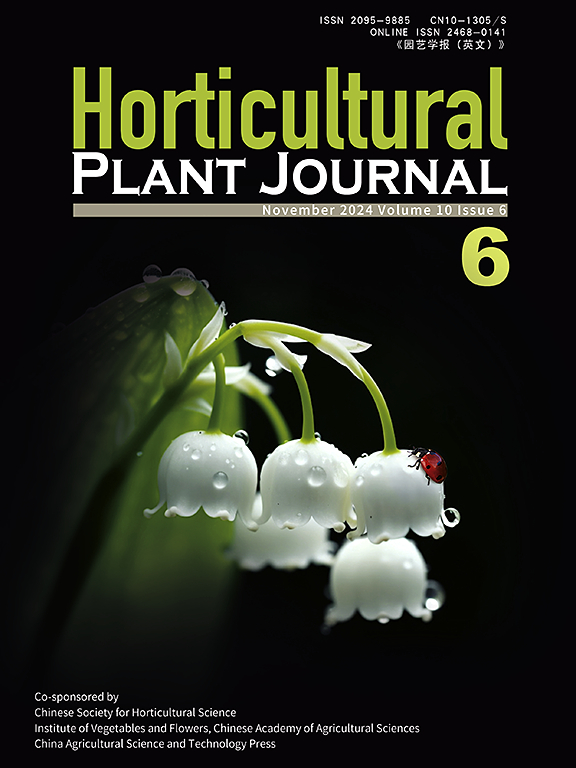Ethylene-mediated resistance to bacterial canker in kiwifruit is suppressed by cool temperature
IF 5.7
1区 农林科学
Q1 HORTICULTURE
引用次数: 0
Abstract
Ambient temperature affects the occurrence and prevalence of plant disease. Most bacterial diseases are damaging at high temperatures. However, kiwifruit bacterial canker caused by pv. () has been found to be prevalent at relatively cool temperatures, and it is unclear how ambient temperature affects the development of kiwifruit bacterial canker. In this study, basal resistance to was suppressed in kiwifruit at cool growth temperature (16 °C) compared with at normal temperature (24 °C). In addition, RNA sequence analysis and ethylene content assessment indicated that ethylene modulated kiwifruit resistance to at normal growth temperature and that cool temperature inhibited ethylene accumulation and -induced activation of the ethylene signaling pathway in kiwifruit. Virus-mediated silencing of the kiwifruit ethylene signaling gene suppressed kiwifruit resistance to at normal growth temperature. Exogenous application of ethylene inhibitor 1-methylcyclopropene eliminated the difference in kiwifruit resistance to at 16 and 24 °C. Exogenous application of ethylene analogues ethephon induced resistance to in kiwifruit. In conclusion, cool temperatures impair basal resistance to by reducing the activation of ethylene biosynthesis and signaling in kiwifruit. The results provide clues for new strategies to control plant diseases in a context of global environmental change.低温抑制乙烯对猕猴桃细菌性腐烂病的抗性
环境温度会影响植物病害的发生和流行。大多数细菌性病害在高温下危害严重。然而,由 pv. ()引起的猕猴桃细菌性腐烂病却在相对较低的温度下流行,目前还不清楚环境温度如何影响猕猴桃细菌性腐烂病的发展。本研究发现,与常温(24 °C)相比,猕猴桃在低温(16 °C)下的基础抗性受到抑制。此外,RNA 序列分析和乙烯含量评估表明,乙烯调节了猕猴桃在正常生长温度下对的抗性,而低温抑制了猕猴桃的乙烯积累和乙烯信号通路的诱导激活。病毒介导的猕猴桃乙烯信号转导基因沉默抑制了猕猴桃对正常生长温度的抗性。外源应用乙烯抑制剂 1-甲基环丙烯消除了猕猴桃在 16 和 24 °C 下的抗性差异。外源施用乙烯类似物乙烯利会诱导猕猴桃产生抗性。总之,低温会降低乙烯生物合成和信号传导的活性,从而削弱猕猴桃的基础抗性。这些结果为在全球环境变化的背景下控制植物病害的新策略提供了线索。
本文章由计算机程序翻译,如有差异,请以英文原文为准。
求助全文
约1分钟内获得全文
求助全文
来源期刊

Horticultural Plant Journal
Environmental Science-Ecology
CiteScore
9.60
自引率
14.00%
发文量
293
审稿时长
33 weeks
期刊介绍:
Horticultural Plant Journal (HPJ) is an OPEN ACCESS international journal. HPJ publishes research related to all horticultural plants, including fruits, vegetables, ornamental plants, tea plants, and medicinal plants, etc. The journal covers all aspects of horticultural crop sciences, including germplasm resources, genetics and breeding, tillage and cultivation, physiology and biochemistry, ecology, genomics, biotechnology, plant protection, postharvest processing, etc. Article types include Original research papers, Reviews, and Short communications.
 求助内容:
求助内容: 应助结果提醒方式:
应助结果提醒方式:


